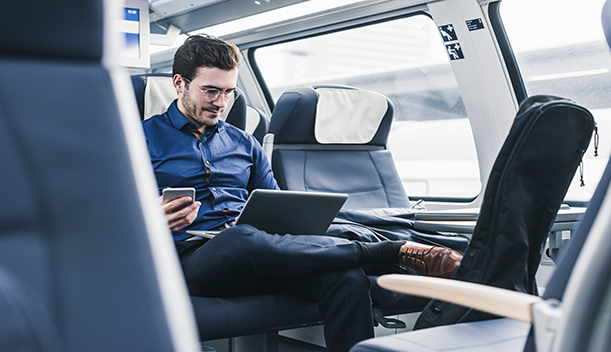How to travel more sustainably
Sustainable business travel is about balancing the financial, social and environmental impacts of a company’s business travel programme. Having a sustainable travel programme can bring multiple benefits, including improved commercial performance and positive brand value.
Choose your business partners carefully
It is, however, never entirely about a single company, because you always need to take into account your wider business relationships – in short, no matter how convincingly a company can prove its Corporate Social Responsibility (CSR) credentials, if those of its suppliers are poor, for example, it diminishes claims to being responsible or sustainable.
A prerequisite to examining suppliers’ standards is to define your own CSR policies in a way that is crystal clear. This means covering such topics as environmental responsibility, diversity, ethics and business behaviour, human rights and a multiple of associated issues. Your people need to know what your CSR goals are and how you live them – and the best way to achieve this is through high-quality and meaningful training.
Responsible business practices on which suppliers can be measured include environment, ethics, labour conditions, compliance and sustainable procurement.
Make sure you check providers’ claims and ask for regular reports on how their CSR programme is progressing. A provider’s CSR governance, for example, can be a good indicator of their level of commitment to CSR.
Any large organisation with serious CSR ambitions should have a staff CSR expert, whose sole role is to define, communicate and implement company policy.
When you travel, do so responsibly
Responsible business travel should start with the counter-intuitive question: do we need to travel? Regular, run-of-the-mill internal meetings should not require anyone to get into their car, let alone fly – they could be held in office meeting rooms, for example, or any other appropriate gathering place. Video-conferencing or teleconferencing will easily accommodate these meetings – you just need a good Internet connection. “Today’s technology allows people to interact meaningfully without their having to be in the same room,” says Paul Stoddart, Managing Director UK, Ireland and Benelux for CWT Meetings & Events. And, as Stoddart points out, it might seem obvious but the “biggest environmental impact you can make is to avoid unnecessary travel.”
However, meeting face-to-face helps to strengthen work relationships and there are occasions where a personal presence is required. In these circumstances, there are many ways to improve the environmental impact of business travel.
Choose the least emissive mode of transportation available
Travelling by rail instead of air reduces travel emissions, while allowing for less hassle and more space to work, think, relax and arrive fit to do business. Where air travel is the only option, there are ways to limit its environmental impact. Taking direct flights reduces emissions, but also travel-time and stress for travellers, who need to be fit to do business on arrival. This means that flying direct is not only better for the environment but for employees, as well.
For local travel, consider having a bike pool or an electric car, so that people can move between your offices, those of your customers or to other nearby sites with minimal environmental impact. “We have a sustainable travel policy ... and that is almost entirely through local public transport,” says Tania Devlin, operations manager for architecture firm Simpson Haugh. “We try to take shorter journeys and we walk rather than book a taxi or take a train or bus. We have a pool car, which anybody with a driving licence can use, and that is generally only if someone is transporting a model, visiting a site or a client whose premises are difficult to get to on public transport.”
In addition, a TMC’s reporting tool should provide options to calculate air travel CO2 emissions, just as CWT’s AnalytIQs does.
Travel with positive impact
It is a business imperative for a company to have a sustainability policy. Building internal practices and policies that take ethical, social and environmental factors into consideration help companies to meet the expectations of their stakeholders, improve
their reputation and their workforce’s well-being. This also applies to travel policies, and today, all the information needed to build responsible travel programmes is easily available - companies just need to use it.
This article was written by Catherine Chetwynd and originally published in Connect Winter 2018.




